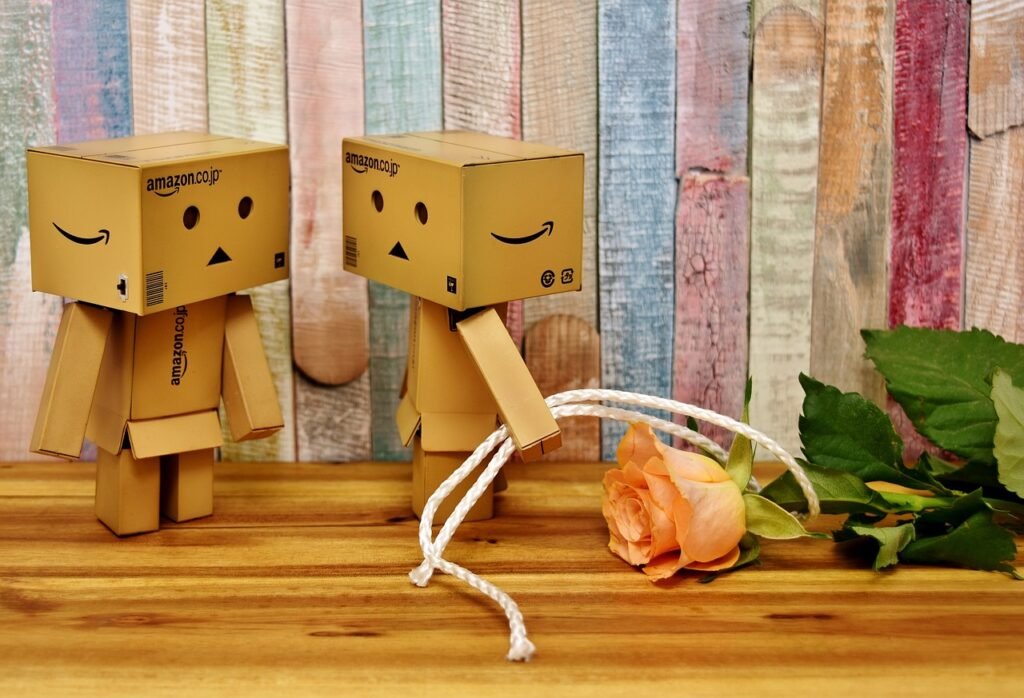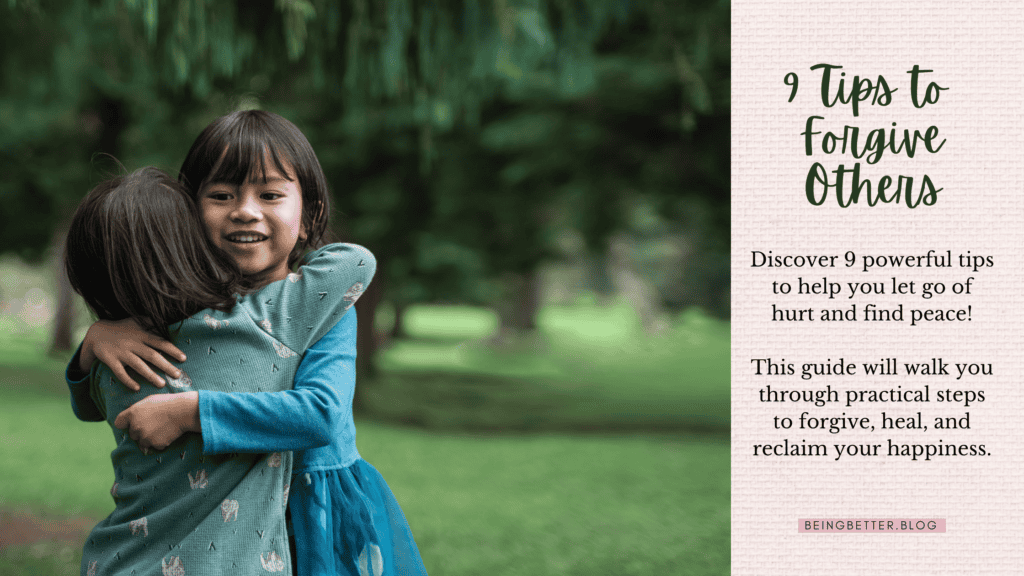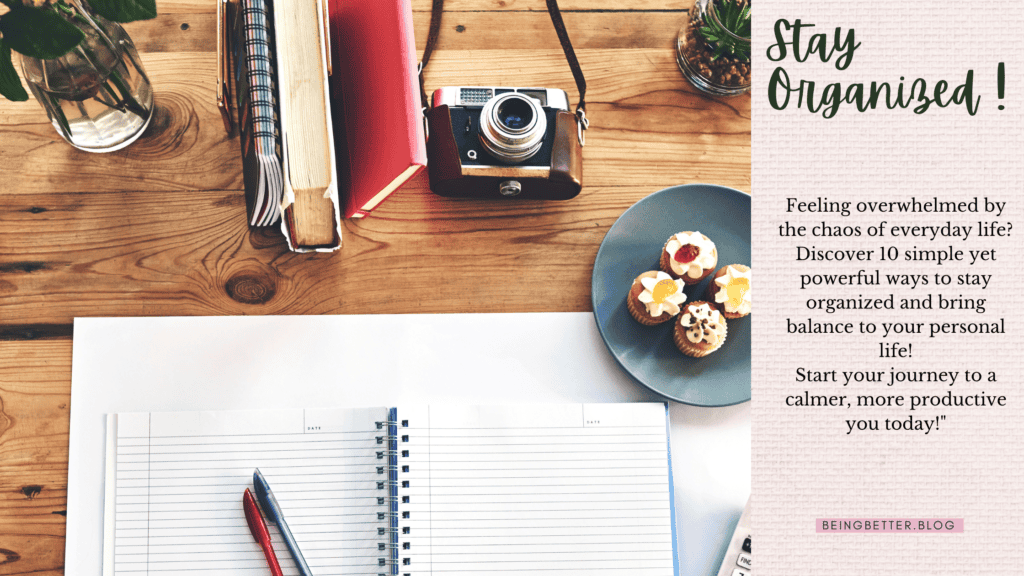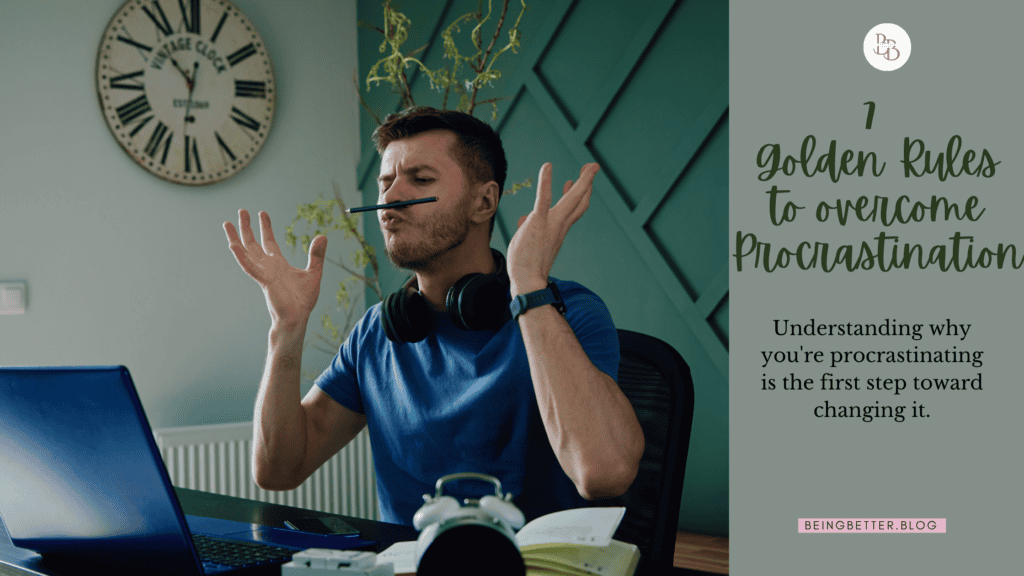
Table of Contents
Tips to Forgive Others: A Journey to Inner Peace
Forgiveness is not a one-time act but a journey of healing, growth, and emotional release. Holding onto resentment can weigh heavily on your mind and heart. By choosing forgiveness, you’re choosing your mental well-being. Here’s a guide to help you navigate this path with grace and self-love.
When I started forgiving others, everything in my life began to shift in the most beautiful way.
I felt mentally free for the first time in years. It was like I had been carrying around a heavy backpack full of anger and sadness without even realizing it—and suddenly, I could just set it down. My mind felt lighter, clearer, and more open to new experiences.
I noticed that my happiness grew without me even trying. I wasn’t stuck replaying painful memories in my head anymore. Instead, I found myself putting that energy into things that actually made me smile—like spending time on my passions, setting goals for myself, and building deeper connections with the people who truly mattered.
Forgiving others also taught me how to build healthier boundaries. I realized that forgiveness doesn’t mean I have to allow the same hurtful behavior again. It means I can let go of the anger while still protecting my peace. That was a game-changer for me.
Another thing I felt was a major drop in my stress levels. My body wasn’t holding onto all that emotional tension anymore. I started sleeping better, breathing easier, and even felt less anxious in situations that used to make me feel overwhelmed.
My relationships began to change, too. When I let go of the bitterness, I made space for compassion and understanding—not just for others, but for myself too. I found it easier to connect with people in a real, genuine way.
Most importantly, my self-respect grew stronger. Choosing to forgive reminded me that my peace is my responsibility. I stopped letting other people’s actions have power over me. That feeling of emotional freedom is priceless.
And honestly, when I changed on the inside, the outside world started responding differently too. I began attracting more positivity—better people, better opportunities, and a deeper sense of purpose in my life.
Forgiving others didn’t erase what happened. But it gave me something much more valuable: my peace, my power, and my happiness.
SO, I am happy to share some of the methods helping in forgiveness from my own experience!
1. Write Down Your Emotions
The very first step to forgiving someone is getting honest about how you feel. I know from personal experience that when emotions are bottled up, they tend to grow heavier and more confusing. That’s why writing them down is so powerful—it helps you face them gently, one by one.
- Start by identifying your emotions.
Ask yourself: What exactly am I feeling? Are you angry? Hurt? Betrayed? Maybe it’s a mix of a few emotions. Write them all down without judging yourself. Naming your emotions makes them feel less overwhelming and more manageable. - Describe what happened.
In your own words, write about the situation that hurt you. What happened? How did it make you feel in that moment? Try not to overthink or filter it—just let the words flow naturally. The goal isn’t to be perfect; it’s to release the story that’s stuck inside you. - Reflect on how you feel today.
After writing about the event, take a moment to notice: Do you feel exactly the same? Has anything shifted even a little? Jot down those thoughts too. Over time, you’ll start to notice emotional changes—maybe the anger isn’t as sharp, or the sadness feels lighter.
Why this helps:
When you see your emotions laid out on paper, it’s like holding them in your hands instead of carrying them on your back. You begin to understand your pain rather than just feeling trapped in it. And understanding is a key part of forgiveness. It lets you move from “Why did this happen to me?” to “How can I heal from this?”
Writing doesn’t erase the hurt overnight, but it gives you a safe space to work through it—and every word you write brings you one step closer to truly forgiving and freeing yourself.
2. Realize Forgiveness Is for You
One of the biggest mindset shifts I had to make—and maybe you will too—is understanding that forgiveness isn’t really about the other person. It’s about you. It’s about protecting your own peace, your health, and your future happiness.
- Remember: Holding onto resentment only hurts you.
When I used to replay painful events in my mind, it felt like reliving the hurt all over again. Meanwhile, the other person had probably moved on, unaware of how much it still affected me. Realizing this made it clear: forgiveness is about setting myself free, not excusing what they did. - Know that forgiveness reduces stress and anxiety.
Studies show that when you forgive, your body actually lowers cortisol levels, the stress hormone. I personally noticed that I felt less tense, slept better, and didn’t get as easily triggered once I started letting go of old grudges. - Notice the boost in mental clarity.
Grudges cloud your mind. They fill your thoughts with anger, sadness, or even fantasies of revenge. When I started forgiving, it felt like I could breathe again mentally. I had more space in my head for creativity, hope, and making decisions that served me better. - Feel your self-esteem grow.
Forgiving someone doesn’t make you weak—it makes you stronger. Every time we choose forgiveness, it reminds us that we are in control of our emotions, not the person who hurt us. It built a quiet kind of confidence that we carried into every part of our lives.
Why this helps:
Understanding that forgiveness is a gift you give yourself makes the whole process less painful and more empowering. You’re not letting someone off the hook—you’re letting yourself off the hook of carrying anger that was never meant to be yours forever. And trust me, that kind of freedom is life-changing.
3. Empathize with Their Situation
I’ll be honest—this step felt a little uncomfortable at first. After all, when someone hurts you, the last thing you want to do is understand them. But I realized something powerful: empathy isn’t about saying what they did was okay. It’s about freeing yourself from the grip of anger.
- Think about their background.
Ask yourself: What might have been going on in their life? Maybe they were dealing with stress, pain, insecurity, or past trauma of their own. I’ve noticed that people who are hurting often end up hurting others, not because it’s right, but because they don’t know better at that moment. - Recognize that humans are flawed.
Nobody is perfect, not even us. Reminding myself that everyone makes mistakes helped soften the wall I had built around my heart. It doesn’t excuse what happened, but it helps you stop seeing them as a monster and more as a human who made a wrong choice. - Separate the person from their action.
This was a game-changer for me. Instead of labeling someone as “bad,” I started seeing that a good person can still make a bad decision. Focusing on why they acted that way—without justifying the hurt—gave me a sense of peace I didn’t expect.
Why this helps:
Empathy creates emotional distance between you and the pain. It allows you to loosen the anger’s grip and look at the situation with clearer, kinder eyes. And when you can see the bigger picture, it becomes so much easier to release resentment and move forward with a lighter heart.
4. Set Clear Boundaries
One of the most important lessons I learned while practicing forgiveness is this: forgiving someone doesn’t mean you have to accept the same hurtful behavior again. In fact, setting healthy boundaries is part of truly loving and respecting yourself.
- Communicate your needs clearly.
After forgiving someone, take some time to figure out what you need moving forward. Then, be honest with them, without guilt. For example, you might say, “I’m choosing to move past what happened, but I need us to communicate differently next time.” When I started expressing my needs this way, it felt like lifting a huge weight off my chest. - Stay firm but kind.
You don’t have to be rude or aggressive to set a boundary. I found that being calm but clear was actually more powerful. Boundaries built with kindness are easier for people to respect, and they also make you feel proud of the way you handled yourself. - Be consistent in reinforcing your boundaries.
This part can be tough, but it’s essential. If you set a boundary and then ignore it when it’s crossed, it sends mixed signals. I learned that the more consistent I was, the more people started respecting my limits—and the more peaceful and safe I felt inside.
Why this helps:
Forgiveness is about healing your heart, but boundaries are about protecting it. Setting and upholding them ensures that you don’t fall back into old cycles of hurt. It shows both yourself and others that your peace matters—and that’s a huge part of true, lasting forgiveness.
5. Focus on What You Can Control
One thing that truly changed my healing journey was realizing that no matter how hard I tried, I could never control what someone else said, did, or felt. But what I could control was my own response—and honestly, that’s where all my power was hiding.
- Shift your perspective.
Instead of constantly replaying the hurt or wondering why it happened, I started asking myself a better question: “What can I learn from this?” It wasn’t always easy, but it changed how I saw painful moments, from unfair punishments to valuable life lessons. - Take actionable steps to care for yourself.
Rather than staying stuck in anger or sadness, I made a conscious effort to pour energy into myself. Simple things like going for a walk, journaling, meditating, or diving into a hobby helped me regain my emotional balance. Even on tough days, those little acts reminded me that I was still in control of my healing. - Let go of the need to understand the “why.”
Some situations are so hurtful or confusing that we crave an explanation. But sometimes, the truth is—you may never get one. Accepting that was so freeing for me. It meant I didn’t have to stay stuck waiting for answers that might never come. I could choose peace for myself, regardless.
Why this helps:
When you stop focusing on what you can’t change and start investing in what you can, you stop feeling powerless. You start feeling strong, centered, and hopeful again—and that’s exactly the mindset that allows forgiveness to naturally unfold.
6. Practice Gratitude
I’ll admit—when I was hurting, gratitude wasn’t exactly the first thing on my mind. But once I started weaving it into my daily life, everything began to shift. Gratitude helped me stop obsessing over what went wrong and start noticing everything that was still beautiful around me.
- List your blessings.
Every evening (or whenever you can), take a few minutes to jot down things you’re grateful for. They don’t have to be huge—some days, my list looked like “a warm cup of tea” or “a friend who texted to check on me.” Over time, you’ll notice your focus naturally moves away from pain and toward the good things you still have. - Find lessons in the pain.
This took me a little longer to accept, but it was powerful: even painful experiences offer valuable lessons. Maybe you became stronger, more aware, or more compassionate because of what happened. Reflecting on how challenges shaped me made me realize that even my hurt had meaning. - Celebrate small wins.
Forgiveness isn’t a one-and-done event—it’s a journey. Some days, just feeling a little less angry or thinking a kinder thought was a huge victory for me. Celebrate those moments. Every step you take, no matter how small, is progress, and it’s absolutely worth appreciating.
Why this helps:
Gratitude gently shifts your heart away from bitterness and toward peace. It reminds you that even after being hurt, life is still full of goodness, and that realization alone makes it so much easier to truly let go and forgive.
7. Use Affirmations
One of the sweetest tools I discovered while learning to forgive was affirmations. At first, it felt a little awkward saying positive phrases out loud, but with time, they started to really sink into my heart and reframe my thinking in the most beautiful ways.
- Create personal affirmations.
Instead of using generic lines, make them personal to what you’re going through. I crafted simple, meaningful ones like, “I forgive because I deserve peace,” or “I release anger to make space for joy.” When your words feel real and specific to you, they hit differently. - Repeat them daily.
I found it super powerful to say my affirmations in the mirror each morning. It felt a little strange at first, but looking myself in the eye while speaking kindness and forgiveness made a huge difference. You can also write them in your journal if that feels more natural. The key is consistency—small daily reminders that you’re choosing healing. - Pair affirmations with visualization.
This little trick made my affirmations even more powerful: as I said them, I would close my eyes and imagine the anger or hurt physically leaving my body, like smoke floating away. Visualizing that release helped me feel lighter, freer, and more in control of my emotions.
Why this helps:
Affirmations gently retrain your mind to focus on peace, healing, and strength. Over time, they help dissolve old resentments and build a deeper belief in your ability to forgive—not for others, but for you.
8. Practice Mindfulness
If there’s one thing that helped me stop carrying old pain around like a heavy backpack, it was mindfulness. Learning to stay present made forgiveness feel so much more natural—and honestly, so much lighter.
- Breathe deeply.
Whenever I felt a wave of anger or sadness come up, I would stop and just take a few deep breaths. Nothing fancy—just slow, intentional breathing. It grounded me in the present moment and calmed the racing thoughts that often fueled my resentment. - Notice your triggers.
I also started paying attention to what triggered my negative emotions. Sometimes it was a memory, sometimes something someone said. Instead of beating myself up for feeling upset, I simply noticed it—“Oh, there’s that anger again.” Observing my feelings without judgment helped take away some of their power. - Incorporate meditation.
I’m not a meditation expert by any means, but even spending just 5 minutes a day sitting quietly helped me reconnect with myself. Guided meditations (especially those focused on forgiveness or letting go) made a big difference for me. It’s not about doing it perfectly—it’s about giving yourself the space to breathe, feel, and heal.
Why this helps:
Mindfulness gently pulls you out of the past and anchors you in the now. When you’re rooted in the present, old grudges lose their grip, and your heart becomes naturally more open to forgiveness.
9. Have an Open Talk with Someone Close
One thing that truly surprised me on my forgiveness journey was how healing it felt to simply talk to someone I trusted. Sometimes we carry so much inside, thinking we have to deal with it all alone—but we don’t.
- Choose someone supportive.
Pick a person who makes you feel safe—maybe a close friend, family member, mentor, or even a therapist. I made sure to talk to someone who I knew would listen without rushing to judge or “fix” me. Sometimes, we just need someone to hear us. - Express your vulnerability.
When I opened up, I didn’t try to sugarcoat my feelings. I let myself be honest about my pain, confusion, anger—everything. Being real allowed me to finally release some of the emotions I had been bottling up. And honestly, just being heard made me feel lighter, even before any advice came. - Seek advice or perspective.
If you feel ready, ask them if they have any perspective to share. Often, hearing a loving outside view helped me see my situation differently—sometimes with more compassion, sometimes with more clarity about what I needed to do next.
Why this helps:
Talking about your pain with someone supportive reminds you that you’re not alone. It helps you process emotions in a safe space, builds emotional resilience, and often sparks the insights you need to fully move toward forgiveness.
Forgiveness is a courageous act of self-love. By embracing this process, you’re choosing freedom, peace, and emotional resilience. Trust the journey, be patient with yourself, and remember—you’re stronger than you think. 💖
These tips have been my guiding light during some of my toughest mental struggles. They’ve not only helped me navigate the waves of hurt and bitterness but continue to shape me into a calmer, stronger, and happier version of myself. Each step in this forgiveness journey brings me closer to inner peace and emotional freedom, reminding me that healing is possible, one day at a time.



